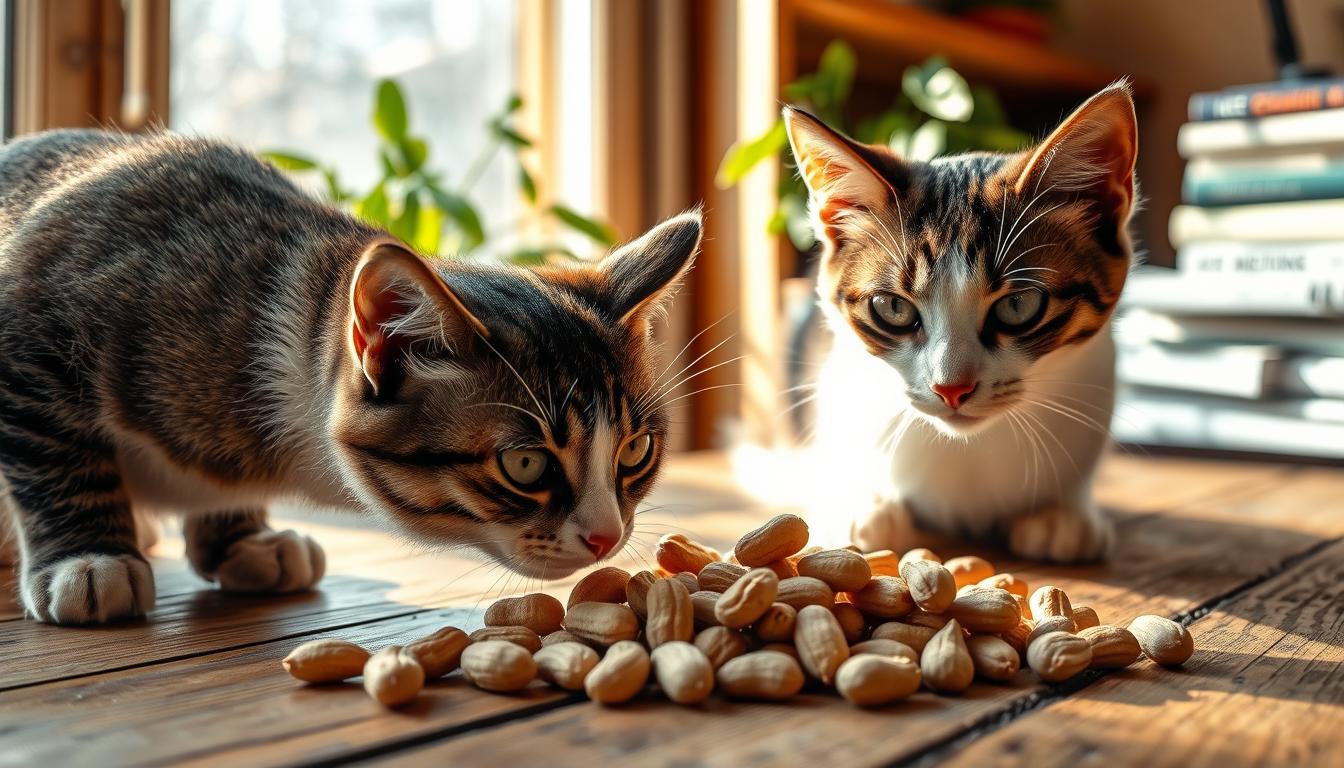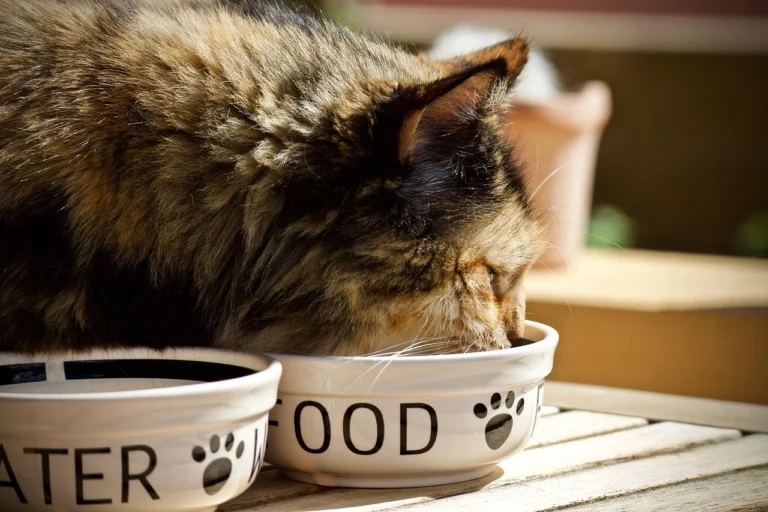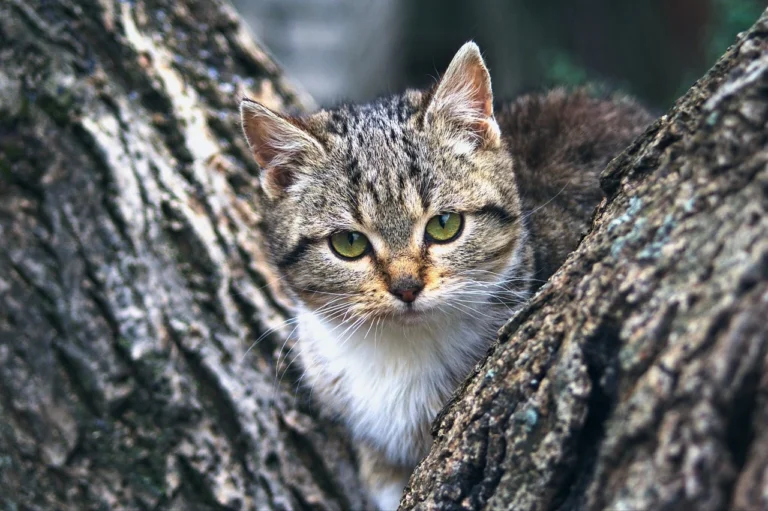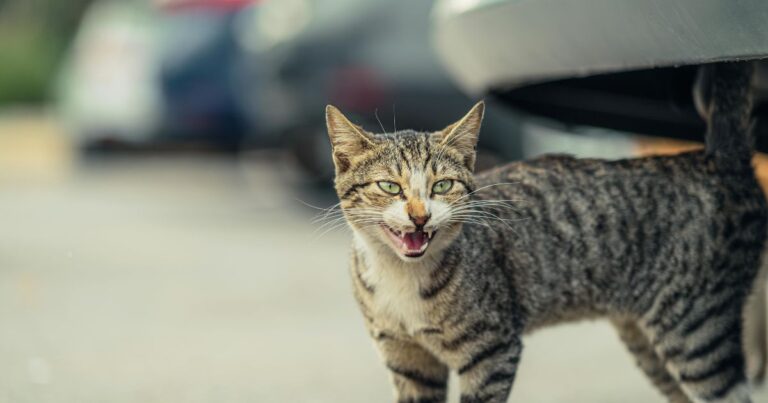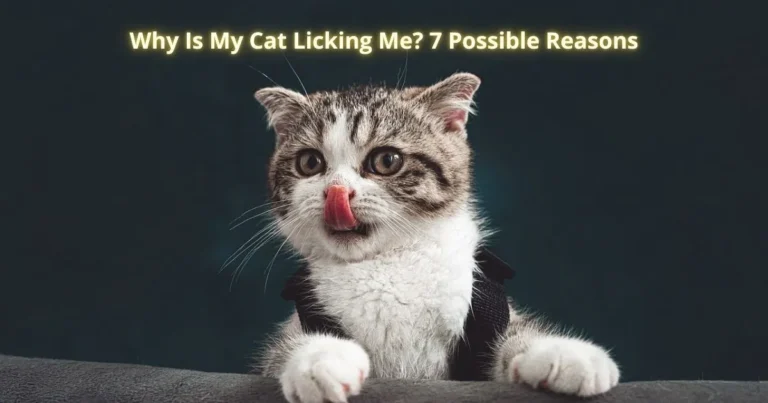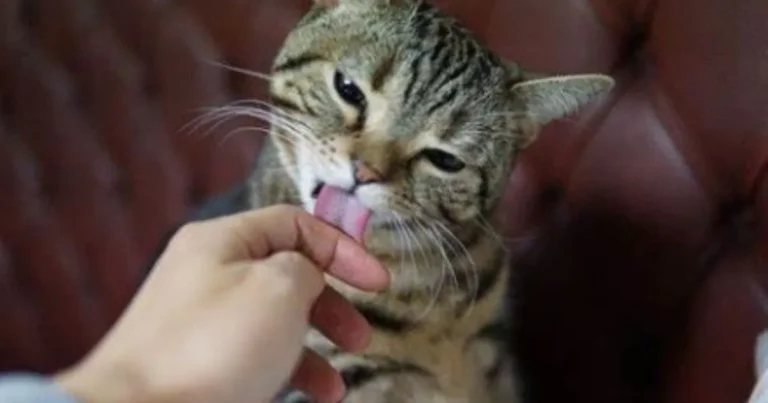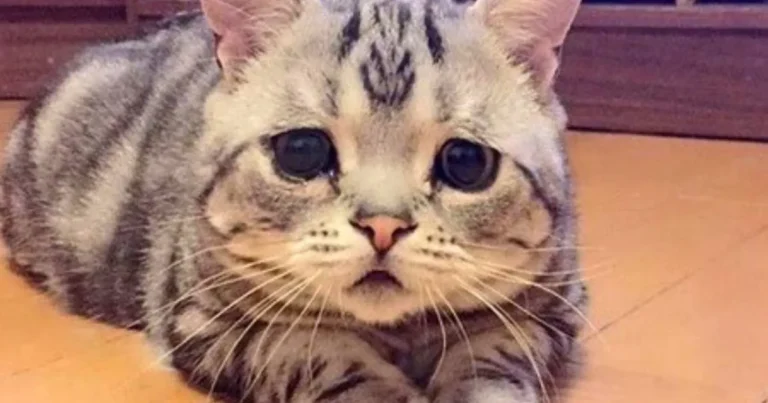Do Cats Eat Peanuts? Vet Insights on Nuts and Feline Diets
Every cat owner has wondered about those curious moments when their feline friend shows interest in human snacks. When it comes to do cats eat peanuts, the answer isn’t as straightforward as you might think. Your curious companion might eye that handful of nuts, but their dietary needs are far more complex than our own.
As a passionate pet parent, understanding feline dietary concerns is crucial. Cats are unique creatures with specialized nutritional requirements that differ dramatically from human dietary patterns. Their bodies are designed to process animal proteins, making nuts a potentially risky treat that could disrupt their delicate digestive system.
This guide will explore the intricate world of cat nutrition, helping you make informed decisions about what lands in your cat’s food bowl. We’ll dive deep into the potential risks and considerations surrounding peanuts and other nut-based snacks, ensuring your furry friend stays healthy and happy.
Table of Contents
Understanding Feline Nutrition and Dietary Needs
Cat food nutrition is a complex topic that requires careful understanding. Your feline friend has unique dietary requirements that differ significantly from other animals. Cats are specialized predators with specific nutritional needs that cannot be met through typical human diets.
Feline dietary concerns go beyond simple feeding. Your cat’s body is designed for a precise nutritional approach. This approach emphasizes high-quality protein sources and specific metabolic processes.
Why Cats Are Obligate Carnivores
Cats are classified as obligate carnivores. This means their bodies are specifically adapted to digest and utilize nutrients from animal proteins. Unlike omnivores, cats have unique metabolic characteristics:
- Require complete proteins from meat sources
- Cannot efficiently process plant-based nutrients
- Have limited ability to convert plant proteins into usable amino acids
Essential Nutrients for Cats
Understanding cat food nutrition involves recognizing key nutritional requirements. Cats need specific nutrients that support their overall health and metabolic functions.
| Nutrient | Purpose | Primary Sources |
|---|---|---|
| Taurine | Heart and eye health | Animal muscle meat |
| Arginine | Protein metabolism | Meat proteins |
| Vitamin A | Vision and immune function | Liver, fish oils |
The Role of Proteins in Cat Diet
Proteins are the cornerstone of feline dietary concerns. Your cat’s body requires high-quality animal proteins. These proteins maintain muscle mass, support immune function, and provide essential amino acids that cannot be synthesized internally.
- Proteins support muscle development
- Provide critical amino acid building blocks
- Help maintain healthy skin and coat
Do Cats Eat Peanuts: Safety and Risks
https://www.youtube.com/watch?v=gOYdSoGpggE
Many pet owners wonder if cats can eat peanuts. While raw peanuts aren’t toxic, they’re not good for cats. Cats have special dietary needs that peanuts can’t meet.
Are peanuts toxic to cats? Not really, but they’re still risky. Cats need meat to stay healthy, and peanuts don’t offer much. Here are some dangers:
- High fat content that may lead to weight gain
- Potential choking hazard
- Risk of digestive complications
- Potential allergic reactions
Vets say no to peanuts for cats. The dangers are too great. Cats need a diet full of animal proteins, not nuts.
Remember: Just because a food isn’t immediately toxic doesn’t mean it’s safe for your cat’s long-term health.
Thinking about treats? Talk to your vet about safe options for your cat. They’ll help pick the right treats for your cat’s needs.
Potential Health Risks of Feeding Peanuts to Cats
It’s important to know the dangers of peanuts for cats. These nuts might look safe, but they can harm your cat’s health.
Cats need special food because their bodies can’t handle plant-based foods well. Peanuts, with their high fat, are especially bad for them.
Choking Hazards and Digestive Challenges
Peanuts are a big choking risk for cats, especially kittens and older cats. Their shape can get stuck in a cat’s throat, which is very dangerous.
- Small cats are more vulnerable to choking
- Nuts can cause intestinal blockages
- Difficult to digest plant proteins
Impact on Existing Health Conditions
For cats with health problems, what they eat is very important. Peanuts can make health issues like diabetes and obesity worse because of their fat.
“Cats are obligate carnivores. Their bodies are not designed to process nuts,” says Dr. Sarah Thompson, veterinary nutritionist.
Allergic Reactions in Cats
Allergic reactions to peanuts in cats are rare but serious. Symptoms can be mild, like upset stomach, or very severe, like anaphylactic shock.
| Allergy Symptoms | Severity |
|---|---|
| Vomiting | Mild |
| Diarrhea | Moderate |
| Respiratory Distress | Severe |
| Skin Irritations | Moderate |
If you think your cat ate peanuts or is allergic, talk to your vet right away.
Can Cats Have Peanut Butter: A Detailed Analysis
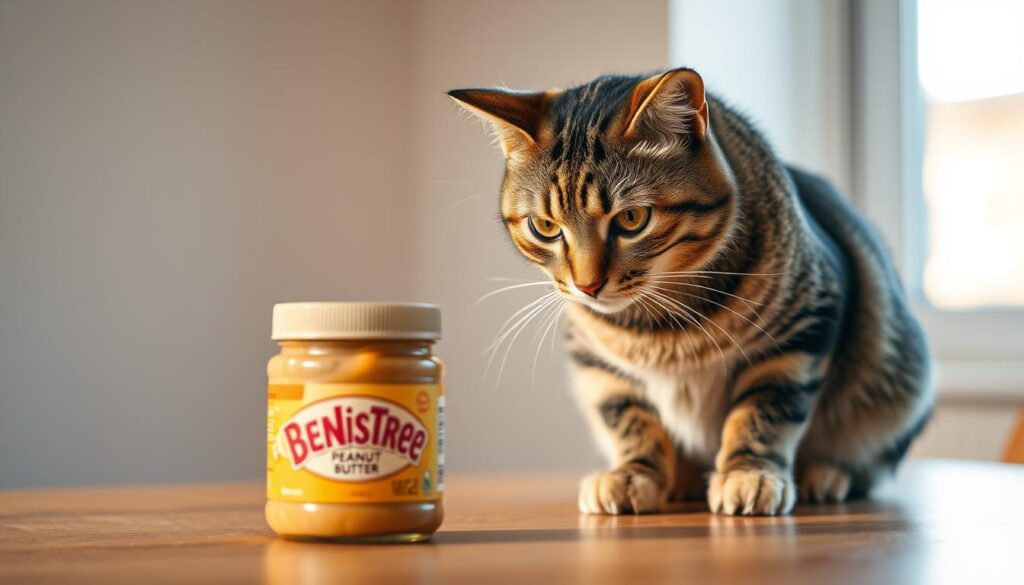
Thinking about adding peanut butter to your cat’s diet? It’s not that simple. While a little might not harm them right away, it’s important to know the risks and limits.
Cats need certain nutrients because they are meat-eaters. Peanut butter doesn’t have what they need for good health. It has too much fat and protein, which can be bad:
- Potential choking hazard due to thick, sticky texture
- Risk of digestive complications
- Unnecessary calorie intake
- Possible allergic reactions
If you still want to give peanut butter to your cat, here’s what to do:
- Choose plain, unsweetened peanut butter
- Check labels for xylitol (a toxic ingredient)
- Limit quantity to tiny amounts
- Monitor your cat for adverse reactions
Vets say peanut butter should be a rare treat, not a regular part of their diet. Your cat needs meat-based proteins for their health.
The Truth About Xylitol and Other Harmful Ingredients
When thinking about peanut butter for cats, it’s key to know what’s safe. Not all peanut butter is the same. Some can be very bad for your cat.
Xylitol is especially dangerous for pets. It’s in many peanut butters and can make animals very sick.
Common Toxic Additives to Avoid
- Xylitol: Extremely toxic to pets
- Artificial preservatives
- Excessive salt
- Hydrogenated oils
Cats can’t handle these ingredients well. Xylitol can cause their blood sugar to drop too low. This can even lead to liver failure.
Reading Peanut Butter Labels Carefully
When picking peanut butter, check the labels closely. Look for ones with just peanuts and maybe a bit of salt.
“Always consult your veterinarian before introducing any human food to your cat’s diet.” – Veterinary Nutrition Experts
| Ingredient | Safety Level for Cats | Potential Risks |
|---|---|---|
| Pure Peanuts | Low Risk | Potential choking hazard |
| Xylitol | High Risk | Insulin shock, liver damage |
| Added Sugars | Moderate Risk | Obesity, dental issues |
Knowing what’s safe for your cat is very important. If you’re unsure, it’s best to avoid human food. Stick to what your vet recommends.
Nutritional Value of Peanuts for Cats
Peanuts are not good for cats when it comes to food. Humans like them, but cats don’t get much benefit from them. Cats need different nutrients than humans do.
Cats are meat-eaters by nature. They need animal proteins to stay healthy. Peanuts don’t give cats what they need.
Peanuts have a lot of fat and not enough good protein for cats. They also lack important amino acids. This can lead to stomach problems in cats.
Vets say cats should eat foods that match their natural diet. Peanuts are not good for cats because they don’t provide much nutrition. They can even upset a cat’s stomach.
| Nutrient | Peanut Content | Cat’s Dietary Requirement |
|---|---|---|
| Protein | 26g per 100g | Animal-based proteins preferred |
| Fat | 49g per 100g | Limited fat intake recommended |
| Fiber | 9g per 100g | Minimal fiber needs |
Remember, just because a food is nutritious for humans doesn’t mean it’s suitable for your cat’s unique dietary requirements.
“Cats require precision in nutrition. Every bite should count towards their health.” – Veterinary Nutrition Expert
Signs Your Cat Has Eaten Too Many Peanuts
It’s important for pet owners to know about health risks from what cats eat. Cats might show signs after eating peanuts, which could mean they have dietary issues.
Peanuts can cause unexpected reactions in cats. It’s key to watch your pet’s health if they accidentally eat peanuts.
Immediate Symptoms to Watch For
- Persistent vomiting
- Unexpected diarrhea
- Sudden lethargy
- Stomach bloating
- Reduced appetite
Identifying Serious Reactions
| Symptom Category | Severity Level | Recommended Action |
|---|---|---|
| Mild Digestive Upset | Low | Monitor at home |
| Repeated Vomiting | Medium | Contact veterinarian |
| Severe Allergic Reaction | High | Immediate veterinary care |
When to Contact Your Veterinarian
If your cat shows many symptoms or seems distressed, see a vet right away. Peanut problems can get worse fast, so a vet’s check is crucial.
Your cat’s health depends on swift and informed action during dietary emergencies.
Safe and Healthy Treat Alternatives for Cats
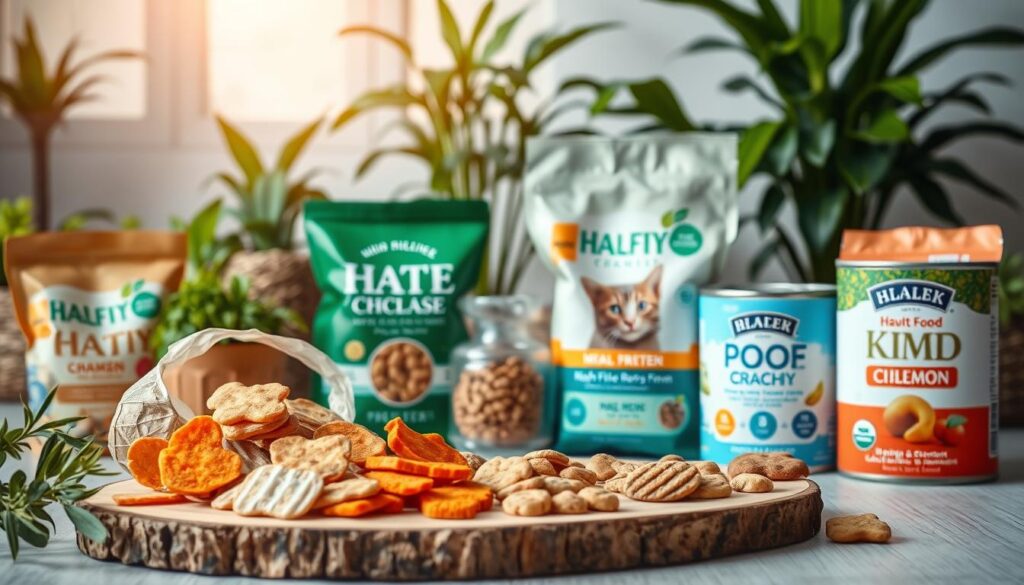
When looking at human foods for cats, pick treats that meet their nutritional needs. Cats need a diet rich in protein because they are meat-eaters. This diet is key to their health.
Here are some safe and nutritious treat alternatives for your cat:
- Cooked Meats: Small pieces of plain chicken, turkey, or fish provide excellent cat food nutrition
- Scrambled eggs (without seasoning)
- Small portions of plain, cooked salmon
- Commercial cat treats specifically formulated for feline dietary requirements
Vets say to choose treats that fit well with your cat’s diet. Look for cat treats that are high in protein and low in carbs. This matches what cats naturally eat.
“Quality treats should enhance, not replace, a cat’s primary nutritional intake” – Veterinary Nutrition Experts
Start with small amounts of new treats and watch for any bad reactions. Always talk to your vet about the best treats for your cat’s health.
Veterinary Recommendations for Feline Treats
Veterinarians give important advice on cat food nutrition. They help pet owners understand their cat’s unique needs. This advice is key for choosing the right treats and diet.
“Treats should complement, not replace, a balanced nutritional plan for your feline friend.” – Veterinary Nutrition Experts
It’s vital to know about pet dietary restrictions to keep your cat healthy. Vets often suggest the 10% treat rule. This means treats should not make up more than 10% of your cat’s daily calories.
- Consult your veterinarian before introducing new treats
- Consider your cat’s age, weight, and health conditions
- Choose treats with high-quality protein sources
- Avoid treats with artificial preservatives or unnecessary fillings
Different cats need different things. Some may have health issues that affect what treats they can have. Your vet can give you advice tailored to your cat’s needs.
| Cat Characteristic | Treat Consideration |
|---|---|
| Senior Cats | Low-calorie, soft treats |
| Overweight Cats | Portion-controlled, low-calorie options |
| Cats with Allergies | Hypoallergenic treat selections |
Getting advice from a vet is crucial for your cat’s nutrition. Regular vet visits and talking openly with your vet can guide you through the world of cat treats and nutrition.
Conclusion: Making Informed Decisions About Your Cat’s Diet
Understanding what your cat needs to eat is key to their health. Cats have special dietary needs that are different from ours. Foods like peanuts can be harmful to them.
Choosing the right cat food is important. It should have the right proteins and nutrients. Your vet can give you advice on what’s best for your cat. Even small treats can be risky if they’re not right for your cat.
Being a good pet owner means knowing what to feed your cat. Stay away from foods like peanuts and watch how many treats they get. Always talk to a vet to keep your cat healthy and happy. Every cat is different, so their diet needs can change.
By learning about your cat’s diet, you can give them the best food. Always follow your vet’s advice on what to feed them. This will keep them healthy and avoid any diet problems.

